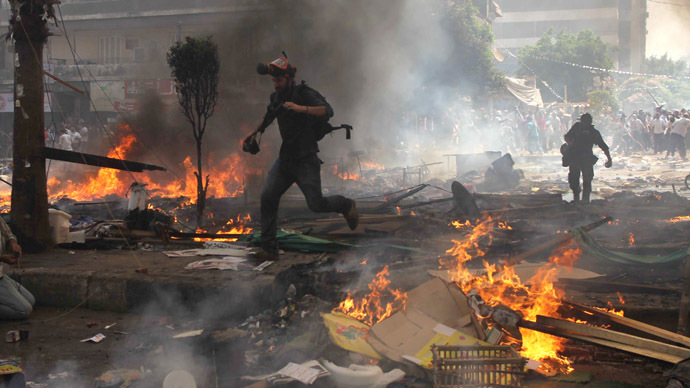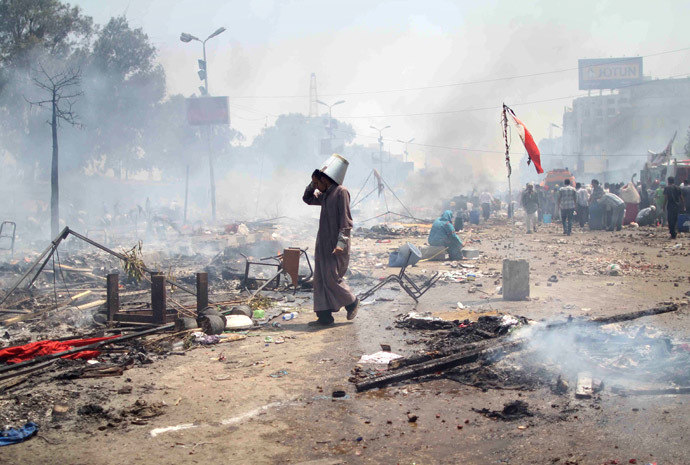Four journalists killed covering Egypt clashes

Reporters run for cover during clashes between Muslim Brotherhood supporters of Egypt's ousted president Mohamed Morsi, and police in Cairo on August 14, 2013, as security forces backed by bulldozers moved in on two huge pro-Morsi protest camps, launching a long-threatened crackdown that left dozens dead. (Mosaab El-Shamy)
Four journalists have been killed in violent clashes which swept Egypt on Wednesday, with a number of the press core suffering serious injuries in the clashes. At least 238 civilians died in total as security forces brutally broke up pro-Morsi rallies.
Egypt has been swept by horrific street violence, showers of gunfire, blazing fires and tear gas as relentless clashes have shaken cities in government attempts to break up the demonstrations.
Among the 238 protesters killed were children, including the 17-year old daughter of a Muslim Brotherhood official. Police stations were torched or stormed by pro-Morsi groups amid the ruthless government suppression.
The violence also took the lives of Sky News cameraman Mick Deane and Dubai-based XPRESS journalist Habeeba Abdelaziz. Both had been covering the pro-Morsi protests in Egypt’s capital which security forces began to ‘disperse’ earlier in the day.
Among the 238 protesters killed were children, including the 17-year old daughter of a Muslim Brotherhood official. Police stations were torched or stormed by pro-Morsi groups amid the ruthless government suppression.
The violence also took the lives of Sky News cameraman Mick Deane and Dubai-based XPRESS journalist Habeeba Abdelaziz. Both had been covering the pro-Morsi protests in Egypt’s capital which security forces began to ‘disperse’ earlier in the day.
Deane, 61, was shot as he was documenting the turmoil in Cairo. Despite receiving medical treatment for his injuries he died shortly afterwards, according to a statement from Sky.
“He was an astonishingly good cameraman, took some brilliant pictures,” said John Ryley, head of Sky News.
Habeeba Abdelaziz was a 26 year old Egyptian reporter from Dubai, who worked for XPRESS – a ‘sister’ publication to the country’s Gulf News.
“It’s hard to believe she’s gone. She was passionate about her work and had a promising career ahead,” XPRESS Deputy Editor Mazhar Farooqui told Gulf News, commenting that the entire team was in a state of shock.
Abdelaziz had been covering protests near Cairo’s Rabaa al-Adawiya Mosque, which has been the site of one of the largest protests for over a month, and a subsequently heavy-handed crackdown by governmental security forces. They reclaimed the area late on Wednesday.
Habeeba Abdelaziz was a 26 year old Egyptian reporter from Dubai, who worked for XPRESS – a ‘sister’ publication to the country’s Gulf News.
“It’s hard to believe she’s gone. She was passionate about her work and had a promising career ahead,” XPRESS Deputy Editor Mazhar Farooqui told Gulf News, commenting that the entire team was in a state of shock.
Abdelaziz had been covering protests near Cairo’s Rabaa al-Adawiya Mosque, which has been the site of one of the largest protests for over a month, and a subsequently heavy-handed crackdown by governmental security forces. They reclaimed the area late on Wednesday.
The third journalist killed was Egyptian Ahmed Abdel Gawad of Al Akhbar newspaper. He died while covering the clashes at Rabaah al-Adawiya. The Egyptian Press Syndicate, a journalist union, confirmed Gawad's death, but did not provide any details.
The fourth reporter to have been confirmed killed is photojournalist Mosab El-Shami Rassd of the news website (RNN), an alternative pro-Islamist media network, Ahram online reports. The agency wrote that he “was killed by the hand of betrayal while covering the Rabaa massacre at the hands of those who executed the coup,” wrote the network on its Facebook page.
Reuters photojournalist Asmaa Waguih also suffered serious injuries after being shot in the leg during protests. Shortly afterwards, she was moved to the international medical center to receive treatment. The Committee to Protect Journalists has released a statement on the issue, saying that the group condemned the killing of Sky News cameraman Mick Deane, prior to hearing of the second death.
Reuters photojournalist Asmaa Waguih also suffered serious injuries after being shot in the leg during protests. Shortly afterwards, she was moved to the international medical center to receive treatment. The Committee to Protect Journalists has released a statement on the issue, saying that the group condemned the killing of Sky News cameraman Mick Deane, prior to hearing of the second death.
“We call on Egyptian authorities to issue clear orders to security forces to respect the right of journalists to work freely and safely while covering events in Cairo and the rest of the country,” said CPJ Deputy Director Robert Mahoney.
“The killing of Mick Deane underscores the urgent need for such action and for all sides to show restraint and allow the media to do their job. The authorities must investigate all attacks on journalists and hold those responsible to account,” he said.
Other journalist were also treated for wounds. An AP photographer was hit in the back of the neck by two birdshot pellets, while Al Jazeera claims its cameraman Mohammed al-Zaki was shot in the arm. In addition, Paris-based Reporters Without Borders says that Tarek Abbas — a reporter for local Al-Watan newspaper sustained gunshot wounds to his leg and eye; and photographer Ahmad Najjar was wounded in the arm.
Approximately a dozen other journalists were arrested or threatened as they tried to document the mayhem: Reuters’ Tom Finn tweeted his own arrest. Daily Beast reporter Mike Giglio also said on Twitter he was arrested alongside two photographers named Mahmoud Abou Zeid and Louis Jammes, stating they had been beaten too.
A state of emergency was declared on Wednesday after Egyptian security forces violently broke up the sit-in camps of Muslim Brotherhood supporters in Cairo. Health Ministry officials say that over 2000 were injured in the nationwide violence, alongside the 278 who were killed including policemen.
“The dead are both from police and civilians,” said the ministry's spokesman, Hamdi Abdel Karim.
However, Muslim Brotherhood spokesman Gehad El-Haddad claimed that as many as 2,000 people had been killed and 10,000 injured in the police operation.
Security forces succeeded in gaining control of the protest camps by the end of the day after turning the capital into what journalists called “a war zone”. A state of emergency has been declared and curfew imposed in major cities including Cairo, Alexandria and Suez. The curfew is set to last for the next month – or until further notice.
A state of emergency was declared on Wednesday after Egyptian security forces violently broke up the sit-in camps of Muslim Brotherhood supporters in Cairo. Health Ministry officials say that over 2000 were injured in the nationwide violence, alongside the 278 who were killed including policemen.
“The dead are both from police and civilians,” said the ministry's spokesman, Hamdi Abdel Karim.
However, Muslim Brotherhood spokesman Gehad El-Haddad claimed that as many as 2,000 people had been killed and 10,000 injured in the police operation.
Security forces succeeded in gaining control of the protest camps by the end of the day after turning the capital into what journalists called “a war zone”. A state of emergency has been declared and curfew imposed in major cities including Cairo, Alexandria and Suez. The curfew is set to last for the next month – or until further notice.


No comments:
Post a Comment